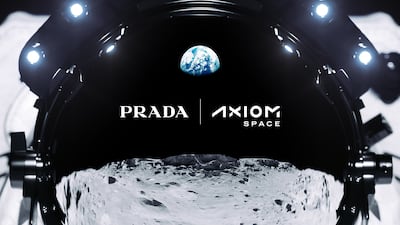The world’s largest space conference will begin in Milan on Monday, with leading international players in the sector putting ambitious plans for the future on top of the agenda.
The week-long International Astronautical Congress (IAC) will host heads of major space agencies, from America's Nasa, to China, the European Space Agency, India, Canada and others.
The Emirates is also expected to have a strong contingent at the annual show, with a UAE Space Pavilion that will include officials from the UAE Space Agency, the Mohammed bin Rashid Space Centre (MBRSC) and private companies based in the country.
A panel hosted by the UAE Space Agency, which will be moderated by The National, will offer insights into how governments and companies are working together to make space missions possible.

Several panel sessions and highlight lectures are set to take place, but the conference also gives space agencies and companies an opportunity to sign important deals on the sidelines, form partnerships and they use the platform to make key announcements.
At previous IAC events, Saudi Arabia announced a deal with Axiom Space to send two astronauts to the space station and unveiled its astronaut programme, while Turkey also signed a similar to deal to launch its first astronaut.
Last year, billionaire Elon Musk joined in for a live call; he also attended the 2016 IAC that was held in Mexico. Amazon and Blue Origin founder Jeff Bezos attended the 2019 event in Washington.
Space agencies to offer updates on missions
IAC is the only conference where leaders of all major space agencies gather on stage to offer insights into their respective space projects.
This year, Nasa is expected to unveil its plans on how it will manage low-Earth orbit activities once the International Space Station is retired by the end of this decade.
Meanwhile, China will be discussing international collaboration opportunities in its expanding space programme, including updates on its lunar and Mars missions.
The Indian Space Research Organisation will likely share recent milestones from the Chandrayaan-3 mission, following its successful lunar landing last year.
Europe’s contribution will feature a session on dark matter discoveries from the Euclid spacecraft, which has started to reveal new insights into the mysteries of the universe.
Russia's Roscosmos is also expected to be present, but the country's space programme has faced challenges in recent years, particularly with sanctions and budget cuts affecting its projects.
Despite these setbacks, Roscosmos could likely provide updates on its partnership with China to develop the International Lunar Research Station.
Astronauts to share dangers of spaceflight
It would not be a space conference without astronauts. There is a panel dedicated to those who have seen Earth from above, including astronauts from the European Space Agency, Japan and the first Turkish astronaut.
They will gather to discuss the dangers of spaceflight.
"Every body intuitively knows that launching into space must be dangerous: rockets burst into flames and thunder just to hurl satellites and humans into space," the conference website said, describing the topic of the astronaut panel.
"Science tells you that space is dangerous: the vacuum and radiation kill humans if not shielded in the artificial cocoon of a spacecraft.
"But we see people buying themselves a ride into space sometimes just for reasons of being the first to do this or that. Rigorous testing and year-long training, once the reason for cost and schedule overruns of space missions – can they be replaced by higher risk acceptance?"


